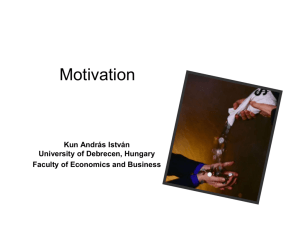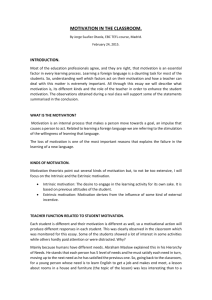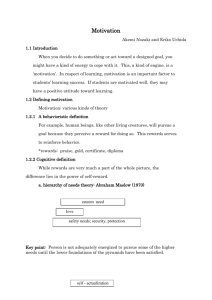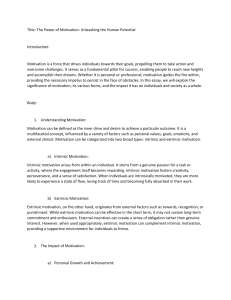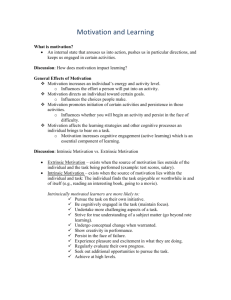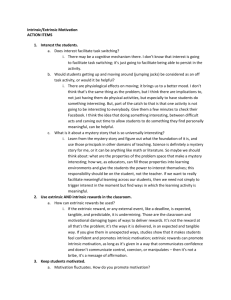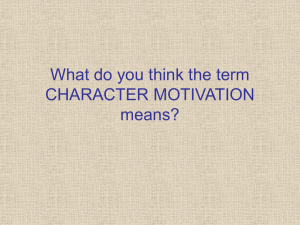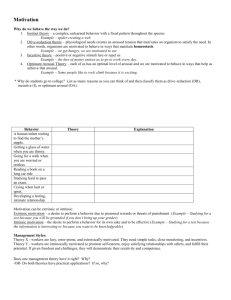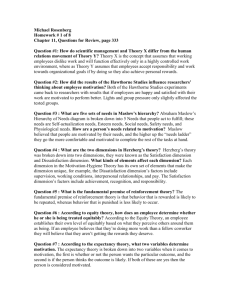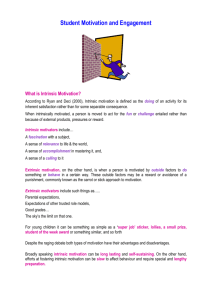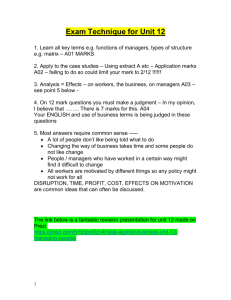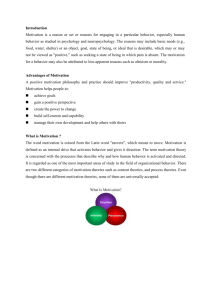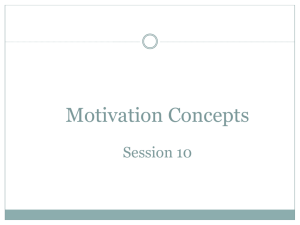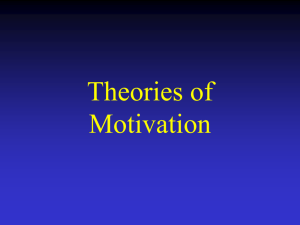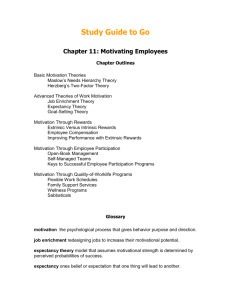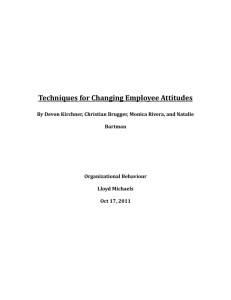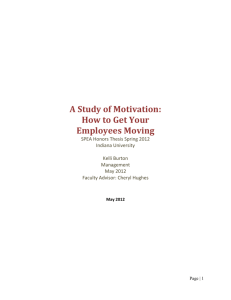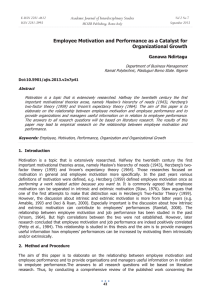Motivation as defined in the Collins Dictionary is a psychological
advertisement
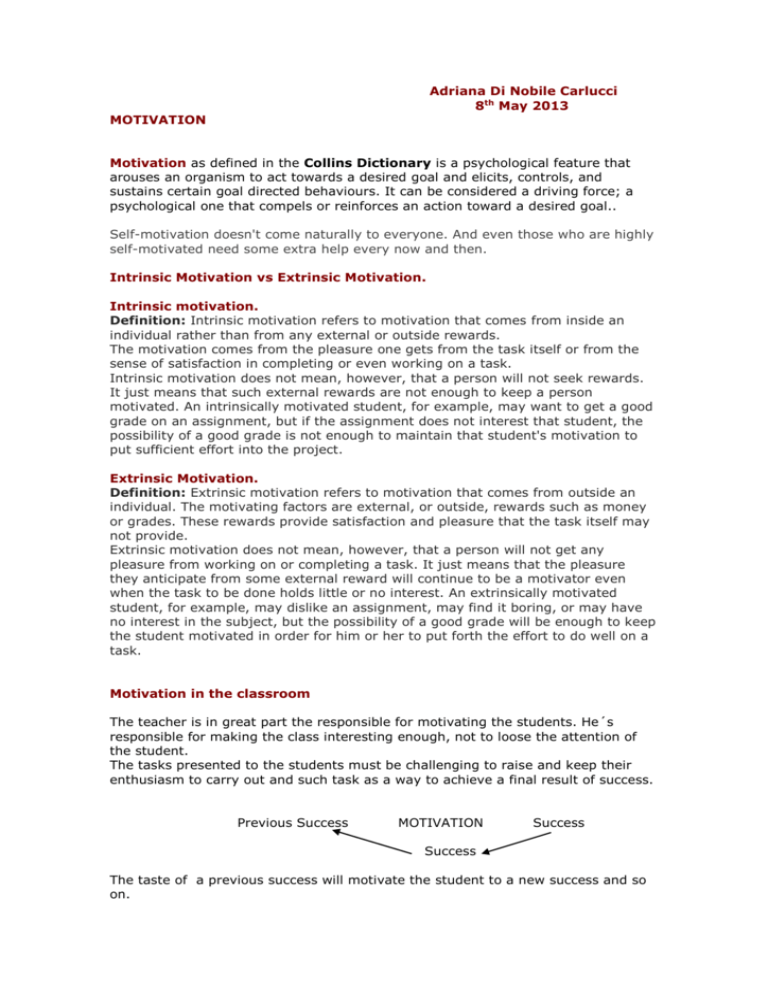
Adriana Di Nobile Carlucci 8th May 2013 MOTIVATION Motivation as defined in the Collins Dictionary is a psychological feature that arouses an organism to act towards a desired goal and elicits, controls, and sustains certain goal directed behaviours. It can be considered a driving force; a psychological one that compels or reinforces an action toward a desired goal.. Self-motivation doesn't come naturally to everyone. And even those who are highly self-motivated need some extra help every now and then. Intrinsic Motivation vs Extrinsic Motivation. Intrinsic motivation. Definition: Intrinsic motivation refers to motivation that comes from inside an individual rather than from any external or outside rewards. The motivation comes from the pleasure one gets from the task itself or from the sense of satisfaction in completing or even working on a task. Intrinsic motivation does not mean, however, that a person will not seek rewards. It just means that such external rewards are not enough to keep a person motivated. An intrinsically motivated student, for example, may want to get a good grade on an assignment, but if the assignment does not interest that student, the possibility of a good grade is not enough to maintain that student's motivation to put sufficient effort into the project. Extrinsic Motivation. Definition: Extrinsic motivation refers to motivation that comes from outside an individual. The motivating factors are external, or outside, rewards such as money or grades. These rewards provide satisfaction and pleasure that the task itself may not provide. Extrinsic motivation does not mean, however, that a person will not get any pleasure from working on or completing a task. It just means that the pleasure they anticipate from some external reward will continue to be a motivator even when the task to be done holds little or no interest. An extrinsically motivated student, for example, may dislike an assignment, may find it boring, or may have no interest in the subject, but the possibility of a good grade will be enough to keep the student motivated in order for him or her to put forth the effort to do well on a task. Motivation in the classroom The teacher is in great part the responsible for motivating the students. He´s responsible for making the class interesting enough, not to loose the attention of the student. The tasks presented to the students must be challenging to raise and keep their enthusiasm to carry out and such task as a way to achieve a final result of success. Previous Success MOTIVATION Success Success The taste of a previous success will motivate the student to a new success and so on. Then is when the teacher will have achieved his/hers own success. Which are the most powerful techniques that the teacher can use in the classroom to keep a student motivated and interested in the subject? The following techniques have been successfully used in the classroom I attended this last four weeks. Exposure to the topics with an extensive variety of techniques : Visuals - drawing or showing pictures Gestures - body language and mimics Focusing in words which will need from the student - repeating, reading, pronouncing and writing Acting to explain the topic Completing sentences by writing or verbally Responsibility for managing our task Discovery- founding out what the concepts are Visual and Sound encouraging motivation - clapping the hands, using words of encouragement, Fantastic ! Excellent ! Guidance to achieve the success the student is looking for Practice activities instead of boring lectures Group tasks to help each others efforts and motivation Achievement of our clearly marked goals Reward and Recognition as acknowledgment of a task well done Challenging practices Personalisation of the tasks to assist our personal growth Encouragement. Feedback Whilst observing recently a lesson I noticed that when the task presented to the student was easy for him, his attention span decreased in an alarming way, whilst when the teacher started writing on the board, his attitude changed altogether, suddenly he was more attentive, optimistic and interested. Could that mean that as David Ausubel mentions in his theories, “ Learners need to integrate new knowledge with that which they have already learned? The student doesn not need to be motivated, for this process to work. David MacClelland suggests other techniques of achieve motivating people: Feedback enables measurement of success Reward which is also regarded as a mesurement of success Abraham Maslow identifies 8 levels of human needs but only two would reflect motivation towards studies Esteem needs - self- esteem, achievement, managerial responsibility Cognitive needs - Knowledge and meaning - rarely found Frederick Herzberg 1923 - 2000) identifies as true motivators: Personal growth, advancement. responsibility, the work itself, recognition, achievement. With this 6 factors satisfied, the person would be truly motivated. Albert Bandura, recognises that our motivation is increased through the experience of observing others been succesfull and willing to achieve the same result (group) Jerome Bruner too believes that the discovery learning, allowing the student to have a say on how and what they study. Make the Class Interesting It's important that the students themselves participate in the process of the lesson, thus making the period an interactive session instead of a dull lecture. Your classroom management strategies should also include effective teaching strategies, which would keep the students glued to the topic. As a teacher you can plan a few activities in the classroom, which will make children get up from their seat and interact with teachers as well as fellow students. The teacher has to understand that the students in the class come from different walks of life. They have different problems of their own, some deal with them while some can't. Stress and conflicts are prominent in the life of students as well. Though they come to school to learn, they have a list of activities in their mind. It's important that the teacher makes his class exciting, so that the students can learn, and at the same time have fun. However, the student itself has to find the whole learning process interesting enough to motivate himself. Bibliography: Abraham Maslow http://www,businessballs.com/maslow.com David McClelland http://www.businessballs.com/davicmcclelland.htm Frederick Herzberg http://www.businessballs.com/Herzberg.htm Albert Bandura htpp://instructional design.org/theories/social-learning.html Jerome Bruner htpp://www.infed.org/thinkers/bruner.htm Carol Bainbridge: B.A. degree in psychology of Purdue University, Lafayette, Indiana Collins Dictionary.
